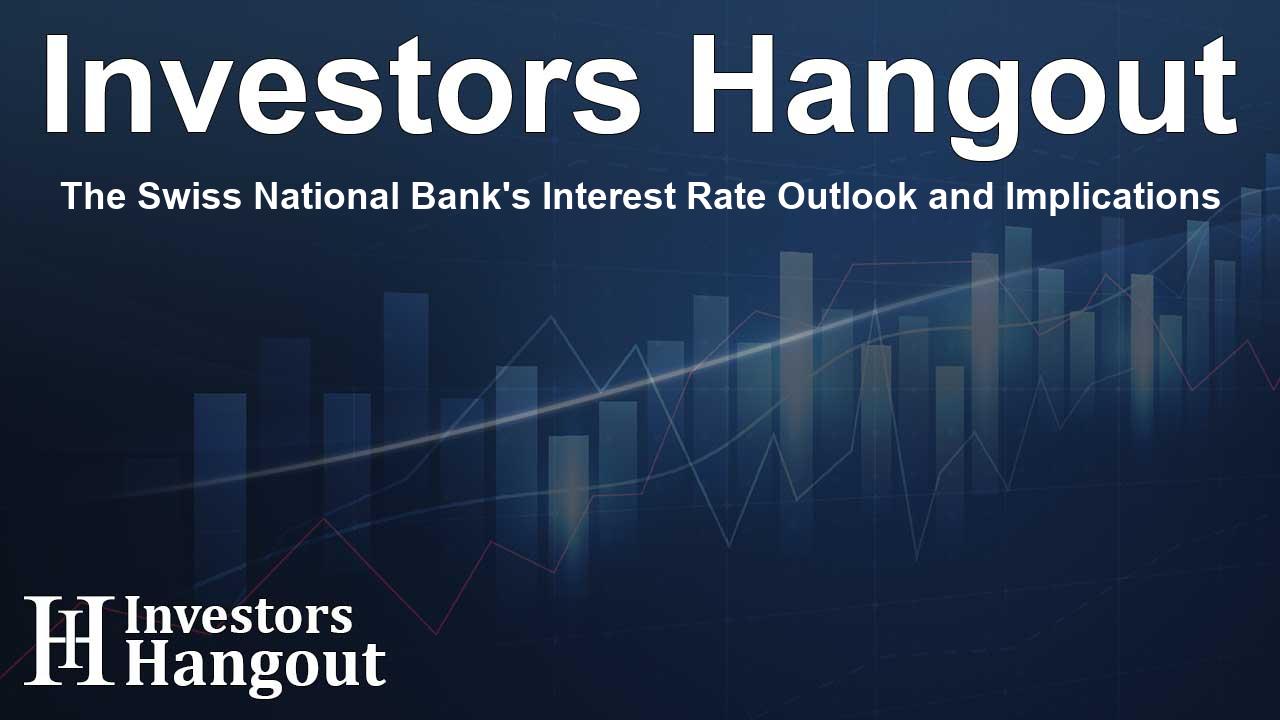The Swiss National Bank's Interest Rate Outlook and Implications

The Current Stance of the Swiss National Bank
The Swiss National Bank (SNB) has recently captured attention as it took a progressive step by becoming the first significant central bank to reduce interest rates in the current economic climate. This move was motivated by a notable shift in inflation, which has aligning back to the SNB's targets.
Understanding Switzerland's Inflation Dynamics
Switzerland has been experiencing lower inflation rates compared to other large economies. As of recent evaluations, overall inflation stood at a modest 1.3%, with the most substantial impacts stemming from rising rental expenses. Excluding rental increases, inflation dropped even further to 0.8%, indicating a potential decline in underlying prices. According to analysts, this could lead to an overall inflation rate that may fall below 1% if the trend continues.
Interest Rate Adjustments and Economic Concerns
The SNB's decision to cut interest rates is primarily attributed to the significant decrease in inflation, trending back to the central bank's desired levels. In contrast to other global economies facing ongoing inflationary pressures, the SNB is wary of the risks associated with inflation dipping too low, which could destabilize the economy.
Industry Indicators and Sluggish Growth Outlook
Switzerland's economic forecast is increasingly alarming, with numerous signals indicating a potential slowdown. The Purchasing Managers' Index (PMI) remains under the critical level of 50, which suggests ongoing sluggish progress. Additionally, signs of a weakening labor market are evident through the Employment PMI, suggesting rising unemployment could be expected soon.
The Potential for Further Rate Cuts
As wages stagnate, especially within the service sector—a significant contributor to the Consumer Price Index—there's a possibility for inflation to diminish further. In this context, the SNB may need to consider more assertive interest rate cuts. Current market anticipations suggest that the SNB may lower rates to around 0.5% by mid-2025, although some financial experts argue that this estimation might be overly cautious.
Zero-Interest-Rate Policy Considerations
If the trend of falling inflation persists, the SNB may even feel compelled to implement cuts deep into zero territory, resulting in a real interest rate of approximately -0.5%, should inflation decrease to about 0.5%. Former SNB President Thomas Jordan has articulated that the neutral real policy interest rate is nearly zero, indicating that should inflation drop below targets, a more stimulative approach through lower rates may be necessary.
Implications for Bond Investors
Investors focusing on Swiss bonds might want to consider a longer duration to leverage rising bond prices stemming from potential SNB interest rate reductions to zero. However, for those managing global fixed-income portfolios, it may be wise to slightly decrease Swiss bond allocations, as other central banks could have more flexibility to lower rates, offering potentially higher returns.
Global Economic Insights from Switzerland
This backdrop in Switzerland may also provide valuable perspectives for potential trajectories in other G10 economies, where unexpected dips in inflation could similarly compel central banks to reevaluate their monetary policies.
Frequently Asked Questions
What was the recent action taken by the Swiss National Bank?
The SNB recently cut interest rates, marking it the first major central bank to do so due to declining inflation levels.
How does Switzerland's inflation compare to other countries?
Switzerland has experienced milder inflation rates, with figures significantly lower than many other major economies.
What economic indicators suggest a slowdown in Switzerland?
The Purchasing Managers' Index (PMI) and softening labor market indicators suggest that Switzerland may be entering a period of slow economic growth.
Could the Swiss National Bank implement additional rate cuts?
Yes, if inflation continues to fall, the SNB may consider further interest rate cuts, potentially even to zero.
What should investors holding Swiss bonds do?
Investors are advised to maintain a longer duration in their Swiss bonds to benefit from possible increasing bond prices if rates drop.
About The Author
Contact Caleb Price privately here. Or send an email with ATTN: Caleb Price as the subject to contact@investorshangout.com.
About Investors Hangout
Investors Hangout is a leading online stock forum for financial discussion and learning, offering a wide range of free tools and resources. It draws in traders of all levels, who exchange market knowledge, investigate trading tactics, and keep an eye on industry developments in real time. Featuring financial articles, stock message boards, quotes, charts, company profiles, and live news updates. Through cooperative learning and a wealth of informational resources, it helps users from novices creating their first portfolios to experts honing their techniques. Join Investors Hangout today: https://investorshangout.com/
The content of this article is based on factual, publicly available information and does not represent legal, financial, or investment advice. Investors Hangout does not offer financial advice, and the author is not a licensed financial advisor. Consult a qualified advisor before making any financial or investment decisions based on this article. This article should not be considered advice to purchase, sell, or hold any securities or other investments. If any of the material provided here is inaccurate, please contact us for corrections.
